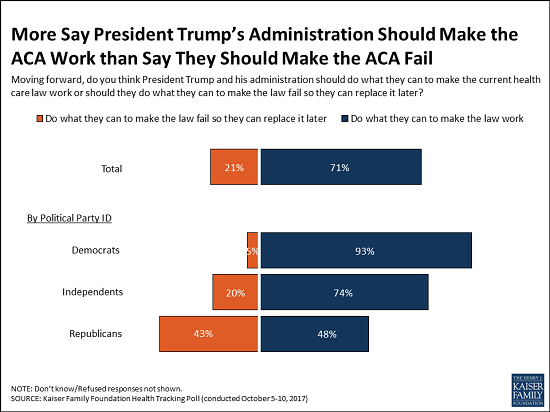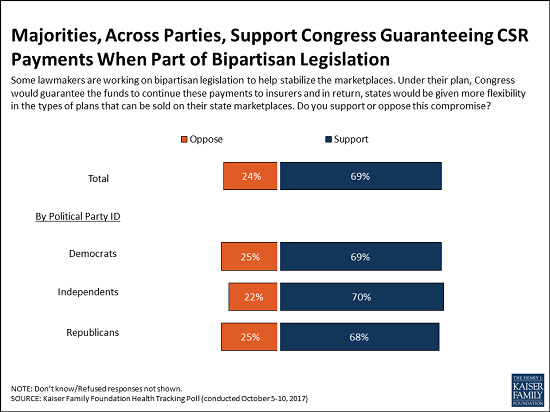|
Poll: 7 in 10
Want the Trump Administration to Make the Affordable Care Act Work Rather
Than Make it Fail
Large
Majorities of Democrats, Republicans and Independents Favor Continuing
Cost-Sharing Reduction Payments as Part of Bipartisan Deal in Congress To
Give States More Flexibility
As the Trump administration begins implementing
Thursday’s executive order aimed at providing alternatives to the Affordable
Care Act’s marketplace plans, a new Kaiser Health Tracking Poll finds a large majority
of the public (71%) want President Trump and his administration to do what
they can to make the current law work.
Fielded just prior to Thursday’s executive order,
the poll finds fewer Americans (21%) say that the president and his
administration should do what they can to make the law fail so they can
replace it later.
The vast majority of Democrats (93%) and three
quarters of independents (74%) say the Trump administration should do what
they can to make the law work. Republicans are more divided, with about half
(48%) saying they should do what they can to make the law work and about four
in 10 (43%) saying the administration should do what they can to make the law
fail.
The poll also finds two thirds of the public (66%)
say it is more important for President Trump and Congress to work on
legislation to stabilize the Affordable Care Act’s marketplaces than continue
efforts to repeal and replace it. That is more than twice the share (30%) who
say it is more important for the administration and Congress to continue
repeal and replace efforts than to stabilize the markets.
Large majorities of Democrats (85%) and
independents (67%) say stabilizing the marketplaces to minimize premium
increases and encourage competition is more important. Republicans, however,
are more divided between continuing repeal and replace efforts (51%) and
stabilizing the marketplaces (43%).
Late Thursday, the Trump administration announced
it would end cost-sharing reduction payments to insurers intended to lower
the deductibles and copayments that low-income marketplace enrollees face.
The poll finds that a majority of the public (60%) favor Congress
guaranteeing those payments to insurers while a third (33%) say they are a
bailout of insurance companies and should be stopped.
Partisans view the cost-sharing subsidies very
differently. While majorities of Democrats (82%) and independents (62%) want
Congress to continue them, most Republicans (55%) say that the payments
should stop.
However, these partisan differences fade when
framed as part of a bipartisan deal to stabilize the ACA marketplaces similar
to the one being negotiated by Senators Lamar Alexander and Patty Murray.
When asked whether they support Congress guaranteeing the funds to continue
the cost-sharing reduction payments as part of a bipartisan compromise that
also would give states more flexibility in the types of plan sold in their
state’s marketplace, a majority of the public (69%) – including roughly equal
shares of Democrats (69%), independents (70%), and Republicans (68%) – say
they support such a compromise.
Despite support for a bipartisan approach, a large
majority (69%) of the public say that they are either “not too confident” or
“not at all” confident that President Trump and Congress will be able to work
together to improve the ACA marketplaces. Fewer (30%) say they are either
“very” or “somewhat” confident that they will be able to work together.
In the past few months, President Trump’s
administration has made a number of changes related to the ACA and the
marketplaces. In general, about twice as many say the actions taken by
President Trump and his administration are “hurting” (40%) the way the ACA
marketplaces are working than say the actions are “helping” (19%). One-third
(34%) say their actions are not having much impact on the way the
marketplaces are working.
When asked about four specific actions the Trump
administration has taken related to ACA marketplaces, the public is largely
divided. Half approve
of the Trump administration decreasing federal spending on advertisements
encouraging people to sign up for health insurance and suggesting the federal
government may stop enforcing the individual requirement to have health
insurance or else pay a fine. On the other hand, most (61%) disapprove of the Trump
administration decreasing federal funding to organizations that help people
enroll in health insurance, and half disapprove
of limiting federal involvement in community events held by states to
encourage enrollment.
Not surprisingly, approval of the actions taken by
President Trump’s administration are largely driven by party identification
with the majority of Republicans expressing approval for each of the four
actions while few Democrats approve of any of the actions.
Other findings include:
METHODOLOGY
Designed and analyzed by public opinion
researchers at the Kaiser Family Foundation, the poll was conducted from
October 5 – 10 among a nationally representative random digit dial telephone
sample of 1,215 adults. Interviews were conducted in English and Spanish by
landline (429) and cell phone (786). The margin of sampling error is plus or
minus 3 percentage points for the full sample. For results based on
subgroups, the margin of sampling error may be higher.
Filling
the need for trusted information on national health issues, the
Kaiser Family Foundation is a nonprofit organization based in Menlo Park,
California.
|
To be a Medicare Agent's source of information on topics affecting the agent and their business, and most importantly, their clientele, is the intention of this site. Sourced from various means rooted in the health insurance industry - insurance carriers, governmental agencies, and industry news agencies, this is aimed as a resource of varying viewpoints to spark critical thought and discussion. We welcome your contributions.
Wednesday, October 18, 2017
Poll: 7 in 10 Want the Trump Administration to Make the Affordable Care Act Work Rather Than Make it Fail
Subscribe to:
Post Comments (Atom)


No comments:
Post a Comment